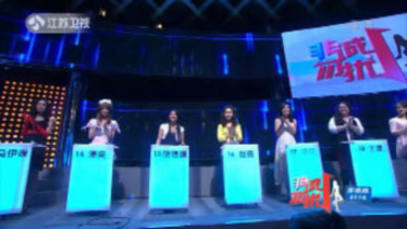If You Are the One: Love at First Sight
By staff reporter ANAIS CHAILLOLEAU
“Let’s go out for a drink tonight, what do you say?” I ask my friend Anne-Sophie. She answers: “Oh no, sorry, I’d prefer to stay home tonight, to watch Feicheng Wurao on TV.”
This conversation made me realize just how enthralling this show must be, for many people. Indeed, each episode – broadcast on Jiangsu TV every Saturday and Sunday evening – scores almost 40 million viewers, not including those who watch it online after its initial airing. Feicheng Wurao, translated into English as If You Are the One, is among the three most popular TV shows in China.
 |
|
The 24 beautiful singles switch the lights in front of them on or off to signify their impressions of the male candidate. |
Standard Framework
The format is simple: a dating show along the lines of the U.S. classic The Dating Game. Twenty-four beautiful singles assess one young man who is gradually introduced to them as the show progresses. In front of each woman is a podium equipped with a light – signifying their passion for the male candidate – which they turn either on or off at the end of each round, during which videos are shown about the candidate giving details of his job, hobbies, and past relationships, and which include friends giving their opinions of him. Each game ends when all 24 women have turned off their light. If the man successfully “keeps their passion alight,” he must then select two finalists to pose questions to before making his final decision.
Certain additional twists add spice to the show. After coming onstage, the suitor must choose the woman that has the most appeal for him, but does not disclose his “crush” until the game is over. Thus, whether the young woman concerned leaves her lamp lit or not, the young man can carry on courting the girl of his dreams. Conversely, during each round any or all of the 24 women can go for the “light explosion” option that signals strong attraction for the candidate, and remain in the running.
Feicheng Wurao is hosted by TV presenter Meng Fei, whom the show has brought national popularity. His ready smile and winning manner give the program its amiable, humorous ethos, which he livens up with jokes and quips. Psychoanalysts Le Jia and Huang Han, who are part of the show’s regular line-up, comment on candidate’s videos and replies in efforts to encourage viewers to give deep thought and consideration to love and married life. This mix between wisdom and entertainment is a main ingredient of the show’s success.
Magnifying Glass on Chinese Society
The glory days of early dating shows were in the West with The Dating Game in poll position. The program lent tempo to housewives’ humdrum lives between 1965 and 1973. Today, however, Westerners appear to favor the Internet over the small screen as a medium for meeting people, to the point where they have lost interest in such TV shows.
In China, where marriage remains a major topic of public discussion, the dating show trend has far from ebbed. Upon coming of age, Chinese sons and daughters are constantly urged by their parents to find suitable matches. A single Chinese woman celebrating her 30th birthday is considered almost tragic. China has always attached paramount importance to family and offspring. And because China is traditionally a patriarchal society there is widely held belief that the role of wife and mother is equally, if not more, important than that of a whitecollar working woman. Finally, as a result of the family planning policy launched (and recently relaxed) in China during the 1970s, the younger generation generally comprises sole children in each family unit. They are consequently under far greater parental pressure than earlier generations to carry on the family line.

